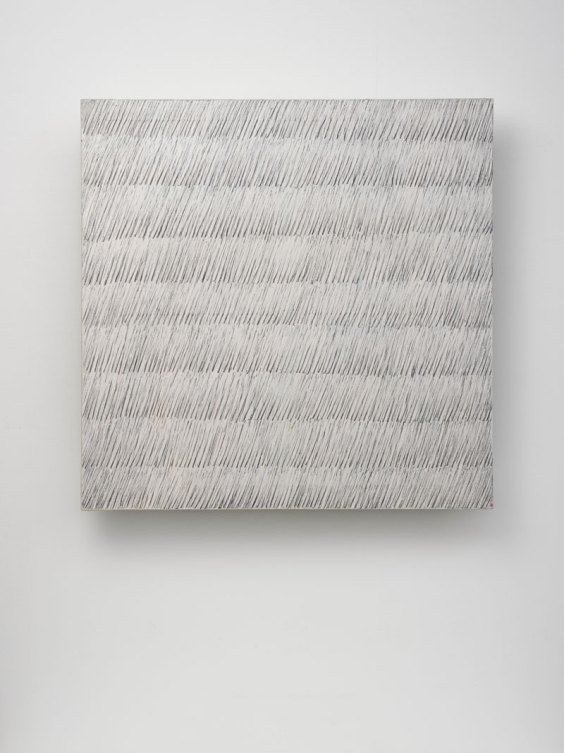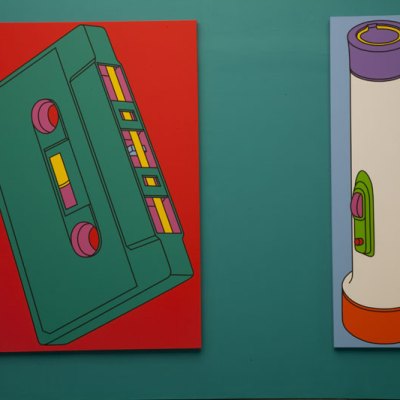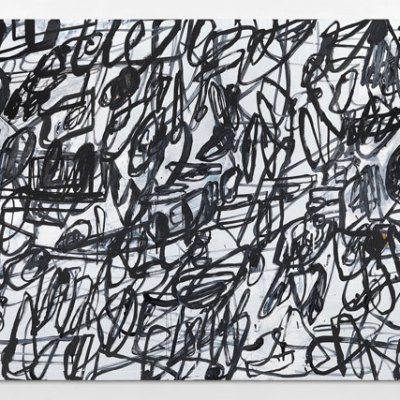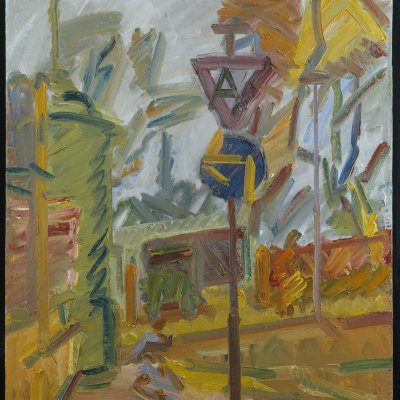January. What a loathsome month. London is colourless, mirthless and freezing. Energy and enthusiasm are distinctly lacking, and the city has all the joie de vivre of Degas’s Absinthe Drinker. For my part, I’ve tried to drag myself out to a few private views since the New Year, but given up before I got as far as the corner shop. This really is something. The opportunity to see lacklustre contemporary art and drink free wine is not to be sniffed at. (These are, quite literally, my favourite things.)
Given the circumstances, the last thing anyone wants to see is a show of Korean minimalist painting at the White Cube. This is stuff we’re all supposed to be au fait with and admire, but the thought of dragging oneself to Jay Jopling’s Mason’s Yard Wolfschanze to see it is a bridge too far. Or so I thought.
It’s been maybe three or four years since I saw anything worth writing home about at the St James’s White Cube. I go and drink the beer they put out (by which really do mean ‘out’ – no drinks allowed inside the gallery at openings), then walk in expecting to be pleasantly surprised. I never am. It’s a staging ground for big name yawns and moderately interesting ideas that have somehow been lost in translation.
But I was in the area and it was approaching 0°. It made sense. And as it turned out, I loved Park Seo-Bo’s Ecriture paintings (until 12 March). Despite having been exposed to enough South Korean art to crash a minor stock market, I was completely ignorant as to Park’s work. This didn’t so much blow me away as hypnotise me and leave me salivating for more.
These are small-ish canvases smeared in off-white oil, thick as freshly set icing on a cake. Into the surfaces are carved identically thin pencil lines, repeated, repeated and repeated again until your eyes are fooled into reading them as script. Like the show itself, all are titled Ecriture. No explanation. No apologies.
Some have the voluptuous wiggle of rococo cursive, others the jagged rudiments of ancient Cretan writing systems. It’s particularly striking how these works embody all the visual characteristics of elementary recorded communication (to the less pseudy, ‘writing’) yet quite purposefully communicate nothing. You think this, and then start to wonder whether it’s just the titles that lead you to this association. Who knows, frankly?
Ecriture (描法) No. 42-73 (1973), Park Seo-Bo © the artist. Photo © White Cube (Ben Westoby)

My next point of call – indeed, my original point of call before I was caught short – was Golden Square in Soho. It’s a short walk from the White Cube, but in terms of sensibility, one might as well be crossing continents. To get there, I joined the early rush-hour slipstream making its way through Piccadilly Circus, which, as Ian Nairn once said, ‘really is the centre of London’:
‘Every important line of force in the West End flows through here: not only Nash’s axis of Regent Street dividing Mayfair and Soho, which now leads directly to the Victoria Tower of the Houses of Parliament… Piccadilly comes in, looking utterly respectable and club like. Coventry Street slips in short and lewd from Leicester Square. Shaftesbury Avenue creeps out as though it knew it lead nowhere. And behind the blind facades on the north side, a dozen alleys slip away into Soho and sin. Long may they stay sinful.’
For all you might complain that Soho has lost repented its sins, I know for a fact that it hasn’t. Yet the cosmetic change to the area in the past decade is striking all the same. A case in point is the Marian Goodman gallery. I’ve described it as ‘palatial’ before, and I don’t recant it: it’s enormous, swallowing you up from Lower John Street like a sardine caught in a David Adjaye designed trap. On the first floor, gallery attendants sit in a bank shouting into phones in American, for all the world like NASA scientists in a space disaster film. Everything is supremely efficient here. Even the wifi works.
The current show is a blast. As a theme, ‘dismembered bodies’ will always be a crowd pleaser, if not exactly a winter warmer. We get some peak-perverse Bruce Nauman (sample title: Sh*t in your Hat – Head on a Chair), some horrendous corporeal contortions from Jean-Luc Moulene and a decent Luciano Fabro mini retrospective. I struggled to see quite why he had been included in the show, but Italia All’Asta gave me a clue: this is a green sheet iron map of Italy hanging against the wall, doubling over itself in homage to an iconic photograph I struggled to put my finger on. Then it hit me: Mussolini at the Piazzale Loreto, 29 April 1945. Google only if in possession of a strong stomach.
Upstairs, past the gallery’s command centre, is a Danh Vo installation in which a 14th-century wooden effigy of the Virgin perches on a rock, staring across the gallery floor like Miranda gazing out to sea. On one wall, the unreadable Madonna is flanked by a photograph of an astronaut adrift in space. The juxtaposition is poetic and powerful, but just when you think you’ve got the measure on it, you notice a mirror, inscribed with a message: ‘Do you know what she did, your c*nt*ng daughter?’ From the sublime to the wantonly ridiculous. That’s January for you.



